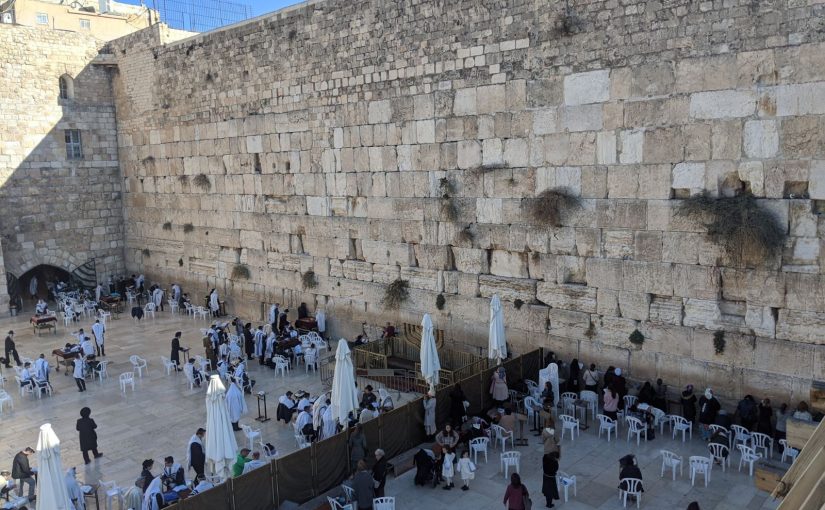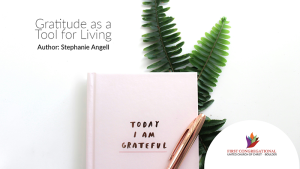You can listen to this week’s Devotional here
Author: Caitlin Smith
Author’s Note: Since October 7, 2023, I have found it incredibly difficult to turn my attention away from the crisis unfolding in Israel and Palestine. In part, the events are uniquely personal – I have close friends who are Jewish, Palestinian, and Israeli-Palestinian, but, mostly, I’ve visited the region three times – each trip sparked a significant transformation in my understanding of what it means to be human – and in the role of religion, places, stories, emotions, and identity in shaping human history and human behavior.
Just after 7:30 pm on March 14, 2016, I gathered with 58 of my classmates at the edge of the Western Wall Plaza and tried to listen to our guide. I found him to be a boring distraction to my quiet, internal theorizing about how religion shapes human identities and distorts human behavior.
I meandered away, fixing my gaze on the vertically stacked, white stone bricks set below a towering gold dome: a combination that has shaped lives, narratives, religions, and wars for centuries. We humans, I reasoned, are wired to become intertwined with our surroundings and to tell stories. Stories of being farmers, carpenters, fighters, healers, or teachers. Stories of survival, heartbreak, hope, faith, betrayal, or triumph. Stories of the events that shaped our lives. Stories about the elements, Gods, lovers, or rivals who threaten us, empower us, or quietly shape the forces we cannot see or control.
Eventually, I saw the group disperse across the Plaza and quickly caught up. I wrapped a scarf over my head and slowly made my way to the Wall. As I did, hushed tones filled my ears and settled my soul. I could feel a magnetic-like energy prickling in the air.
I stood at the base of the Wall, just next to the fence separating the men’s and women’s sections. I stared up at the 62 vertical feet of ancient blocks that seemingly reached to the heavens. I delighted in the piles of dirt and hints of green foliage nestled in the Wall’s cracks and crevices. Scars and souvenirs marking the thousands of sunrises and sunsets the Wall has witnessed, the centuries it spent buried underground, and the untold number of prayers, tears, hands, and whispers it has absorbed.
I turned and watched those around me. They scribbled prayers on tiny slips of paper and tucked them into the cracks. Some held Torahs in their hands – opened to prayers that captured their truths – and whispered them to the Wall. Some cried; some swayed – surrendering to the energy and needs of the moment. Some closed their eyes, bowed their heads, and silently prayed. Some placed their hands on the Wall – using it for balance, strength, or a direct connection to a cornerstone of their identity.
I imagined prayers for the rigors of humanity that afflict us all: prayers for grades, promotions, or external successes; for sick or struggling loved ones; to heal heartbreak, betrayal, or grief; to find companionship or romance; to solve financial troubles; to bear children; to understand our children or loved ones; to find our passion; to know and accept our true selves; or to know our scars, insecurities, hopes, dreams, heartbreaks, setbacks, love stories and adventures will be heard with compassion, joy, understanding, and acceptance.
I stood, transfixed, for what felt like an eternity. My brain returned to my earlier theory on how religion shapes human identities and distorts human behavior. Eventually, a lightbulb went off: we crave spaces for our souls to be heard – for the raw, unfiltered, and inexplicable realities of our experiences to have an outlet. Religion gives us physical spaces, rituals, communities, and stories for our humanity to be heard. We crave it, return to it, fight wars over it, build or end relationships over it, design ceremonies around it, and anchor our identities around it. We do these things because having our humanity heard and explained gives us the strength, resilience, and grounding to keep breathing, grinding, building, striving, and hoping. To witness humanity’s darkest evils and awake, after another sunrise, determined to rise above it.


